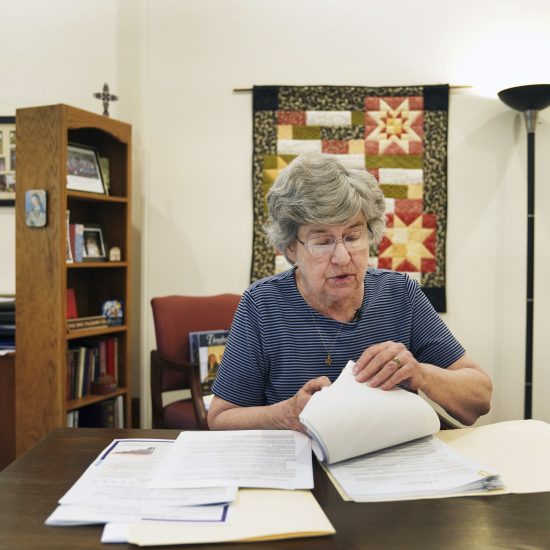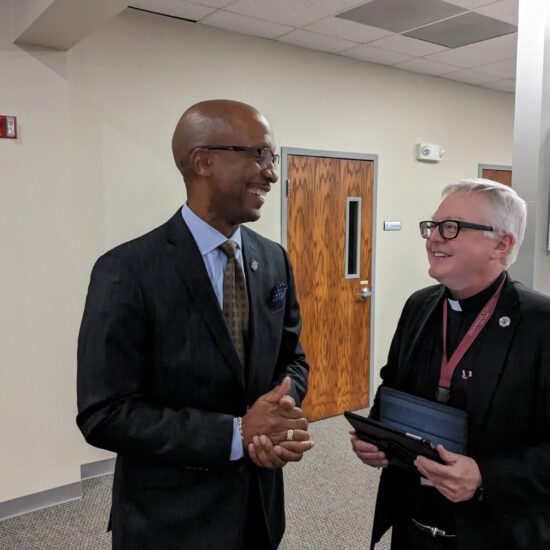Metropolitan Missionary Baptist Church’s massive building is a landmark in an economically depressed Kansas City, Mo., neighborhood. But it also is a beacon to many who live in the community and struggle to get by.
The congregation’s Mercy Ministry — its food and clothing pantry — is a welcome stopping point for residents on the second and third Tuesday mornings each month. They are allowed to visit one Tuesday every two months for food and once a month to peruse clothing items hung and stacked neatly in the church’s pantry on the basement level, within easy access from the front door.
The ministry tries to serve 15 families or individuals well with its food ministry each time it is open, so limiting the frequency that people can come enables the congregation to help more families on a regular basis.

The Mercy Ministry food and clothing pantry team at Metropolitan Missionary Baptist Church in Kansas City, Mo., pauses after completing a recent Tuesday morning distribution. They are (left to right) Irene Wilson, Kelsie Brown, Thurman Hardaway, Ida Burgette, Coordinator Willa Jones, James Quarles and Blanche Thomas.
|
Willa Jones, Metropolitan’s longtime Mercy Ministry coordinator, became a part of the pantry in 2003 and has coordinated since 2005. Jones sharpened her relationship and personal service skills in a lengthy career as a consumer affairs representative with the Kansas City-based Hallmark Corporation.
At Metropolitan’s pantry, food packages are tailored to meet a person or family’s particular need, Jones said.
“We assemble the food packages as people come to Mercy Ministry,” she explained. “Requests for food vary depending on the family size or a special need.”
The larger the family, the larger the package, she said.
“Some people that come to us are homeless,” Jones said. “We would then make a package that includes pop-top canned ham or chicken breast, and fruit. We give peanut butter, bread and anything that does not require cooking. Some do not need canned goods; some do not need pasta or beans or rice.
“We try to meet the needs but avoid giving away items that will be wasted,” she said.
“People are so appreciative of our service, such as a family who have been victims of a fire, and their money and credit cards were lost,” Jones said. “We were able to provide a small amount of help by providing them with food.
“When something like this happens, you can think, ‘What if this happened to me?’”
“Our mission statement is to serve our congregants and the community,” said Marian Halim, facilitator of the congregation’s various mission programs. Though the long-standing program — “50 years at least” — has evolved into a more formal and organized approach through the years, “We never turn anyone away,” she said.
The ministry has been known to help 30 families on a Tuesday morning, but these days overflow families may also be referred to other pantries in the area.
It is important to try to maintain a reserve of “pretty much everything” because “sometimes we have an emergency need,” Jones explained.
“Sometimes on Sunday, congregants approach Willa or me privately” with particular needs, Halim said. One of them can run down to the pantry and prepare a package on the spot.
“They know Sister Willa is the face of the ministry,” so people often call on her, Halim said. “Sometimes people walk in off the streets with an emergency need.”
“Metropolitan is known as a caring church, and they can come for everything they need,” Halim said. “We are vital to the community.”
Maintaining church food pantries is not for the faint of heart. Halim says that to initiate such a ministry in the first place, the church body must commit to help it succeed and grow.
“It is important to get support from the church, but also the congregants,” she said. “We take support from the community; different places send food to us, such as bread from grocery stores.”
“We have provided technical assistance in how to set up programs,” Halim said. And not all have been from urban settings like Metropolitan. Some are from more rural areas, she said.
“Rural issues are the same as urban issues” when it comes to hunger, she said. She believes that in rural areas, people who need help may often be less likely to acknowledge their need or reach out for help.
Halim vividly recalls a mother and three small children who came to the church on a Wednesday evening, when the congregation has a prayer meeting and Bible study. They were in obvious need of food and clothing. Halim believes the young mother had just gotten out of the hospital.
“She came to the church, met with the leaders and we gave them something to eat right then,” Halim said. Food had been prepared for the youth as it usually is on Wednesday evening, so the family was given a meal.
After they had eaten, the mother and her children were taken to the Mercy Ministry pantry, where a package of food items was prepared for them.
Others noticed the family’s need. “A group of deacons collected money between themselves on the spot to help the family,” Halim said.
Jones is proud of her Mercy Ministry team of Irene Wilson, Kelsie Brown, Thurman Hardaway, Ida Burgette, James Quarles and Blanche Thomas.
Thomas, who has been a member at Metropolitan for 68 years, said she enjoys the fellowship with other team members and the people who come to the pantry. “You meet different people; you are dealing with different types of people,” she said.
“We want to show love; we have Christ in our life,” Burgette said. “We say good morning and show love,” and sometimes pantry visitors come back and want to become a part of the church.
“Sometimes you have to be very tactful,” Jones said. Her team is careful to show respect to those who come for help.
“It is a blessing to me to just be a part of the service that my church…provides for this community,” she said. “Also to be able to work and fellowship with such a wonderful, faithful and dedicated group of other church members.”






